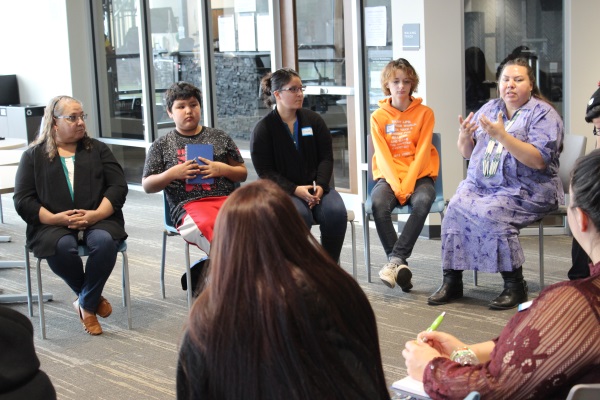
It’s a way to ensure the successes of tomorrow – to plant the seeds for developing the leaders of the future.
Youth from all over the state gathered for the Ho-Chunk Nation Youth Leadership Conference on Saturday, Nov. 3, at the new District 1 Community Center in Black River Falls.
This is the second year for the Youth Leadership Conference. There were 50 youth present.
The conference consisted of a keynote speaker, a legislative social, lunch, an after-lunch speaker, cultural advice for the males from Traditional Chief Clayton Winneshiek, cultural advice for the females from the Clan Mothers, and a talk from Bill Quackenbush about Ho-Chunk history: past, present, and future.
According to Carol Garvin, one of the founders and coordinators for the event, the idea came from talking to the youth.
“They had a youth meeting in which they asked the youth what they would like in a program. They answered that they never get to talk to elected officials,” Garvin said. “They felt that they didn’t know they could make difference and if they have questions, they could feel free to ask.”
They are especially interested in the Nation – the government and how it works, she said.
“The conference is an opportunity to learn and set goals and to be leaders throughout their lives,” Garvin said. “We don’t just push being leaders through higher education, but also in trade skills, too. We emphasize to become the best possible leaders no matter what they do.”
Samantha Skenandore was the keynote speaker and she spoke on the subject “Leadership and Revealing the Best Version of You: Mastering Executive Judgment.”
She said that everyone can be a leader whether they realize it or not. Every child with a younger brother or sister is a role model because younger siblings watch everything they do.
One of the biggest indications of leadership is being able to handle crisis. Remaining calm during duress gains confidence from others.
Another test of leadership is being snubbed or treated unfairly.
“Don’t act like a fool. Act calmly and rationally. If you become angry, you make it worse,” she said. “And don’t pull the race card.”
People are more impressed with people who have it together, who have good health, physically fit, like a well-working machine.
She referred to decisions made by individuals as “executive judgment.” With good executive judgment, studies find that married couples experience a lower divorce rate, a greater sense of peace, a feeling of belonging, and better teeth.
Another aspect is how people handle failure.
“You can’t succeed without failure. By learning from mistakes and failures, a person transforms and adjusts so that the person can grow and eventually succeed,” Skenandore said. “Good leaders make good executive decisions, earn trust, manage fear, manage failure, and deflect credit to others.”
Who people associate with makes a big difference in the outcome. A person needs to build on relationship to become successful and a person can’t do it all himself or herself, she said.
“A successful person builds a network of people or resources and then maintains those relationships,” she said.
Time management becomes important to make possible extraordinary successes.
Skenandore said that everyone has the same amount of time. People have their daily lives filled with work or school, sleeping, chores and other necessary functions, However, on the average, people have 4.5 hours of discretionary time per day. That allows enough time to work on their hopes and dreams.
“That’s why planning to fulfill those dreams is important. People need to plan, practice, ask for help, expect failure, and then try again to achieve success,” she said. “Spend that time working on your goals.”
Michelle Greendeer-Rave gave a speech following lunch on the topic “Reprogramming Your Mind and Applying Yourself to the Maximum Capacity.”
She said that reprogramming is necessary to become a futurist. She told of how Nancy Oestreich Lurie, a scholar, and friend of the Ho-Chunk people. Lurie had told her that Ho-Chunk people value money differently versus how non-Ho-Chunk people value money.
Other people will take a dollar and put half of it away, spend a quarter of it on bills and use the other quarter as discretionary spending, Greendeer-Rave said. Ho-Chunks, on the other hand, will take the family out for dinner and spend the entire dollar. They value now and making memories more than planning for tomorrow.
“We value money differently than other people. We give it away. We want to share it as soon as we get it,” she said.
Another need for achieving success is for people to get out of their comfort zones, she said. If people don’t get out of their comfort zones, they’re not growing. One of those uncomfortable zones is speaking up, sharing their opinions.
“As you become more comfortable with expressing yourself, people come to you for advice,” she said.
The main point she emphasized is for people to start thinking of what can be accomplished and how they can get there.
“Think about yourself and your future,” Greendeer – Rave said. “Think of the future of the Ho-Chunk Nation. We have been focused on the past and the present, but we need to think of our future.”




























